Guidelines
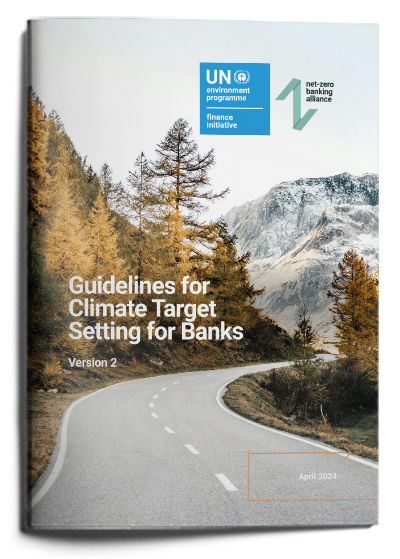 |
Guidelines for Climate Target Setting for Banks – Version 2Published March 2024 The original version of the Guidelines for Climate Target Setting for Banks, published to coincide with the launch of the Net-Zero Banking Alliance in April 2021 states that the guidelines, ‘…will be reviewed at least every three years.’ To meet this commitment, NZBA banks led a review of the original version of the guidelines from early 2023. A large number of member banks shared their views on what an updated version might look like, informed by their experience of applying the guidelines, setting and implementing climate targets, and financing transitions in different sectors. Based on these consultations, NZBA developed a new proposed version which the membership voted to adopt in March 2024. The new version reflects changes in science, regulation, data, and methodologies that took place in the three years since the original version was published. It reinforces the guidelines, further outlining key principles to underpin the setting of credible and ambitious targets in line with achieving the objectives of the Paris Agreement. The updated version of the guidelines will apply to all new targets and any new iterations of existing targets set after 22 April 2024. |
 |
Supporting Notes for the Guidelines for Climate Target Setting – Version 2Published May 2024 |
 |
Net-Zero Banking Alliance Disclosure Checklist – Version 2Published July 2024 |
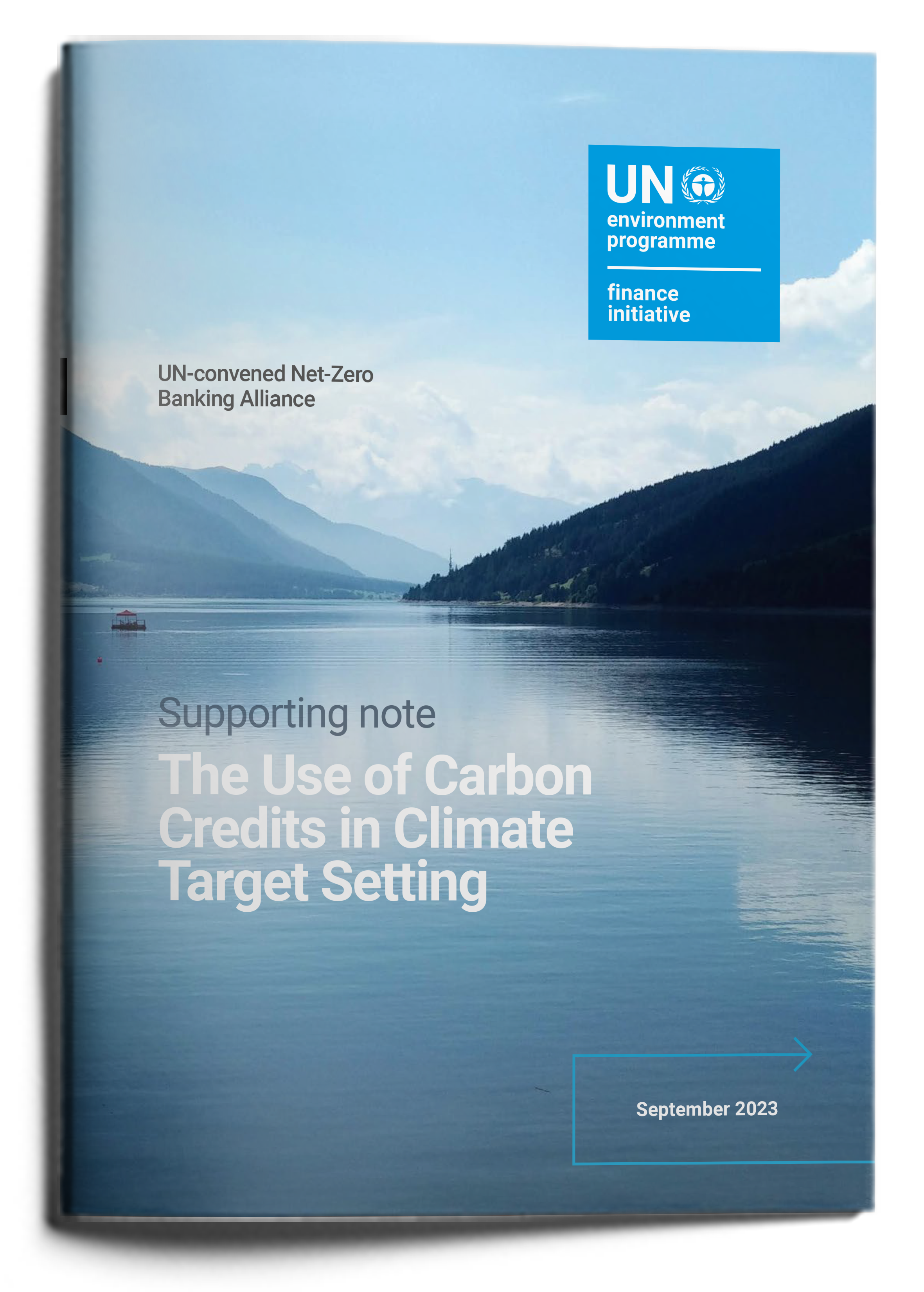 |
Supporting Note: The Use of Carbon Credits in Climate Target SettingPublished September 2023 |
NZBA Progress Reports and Updates
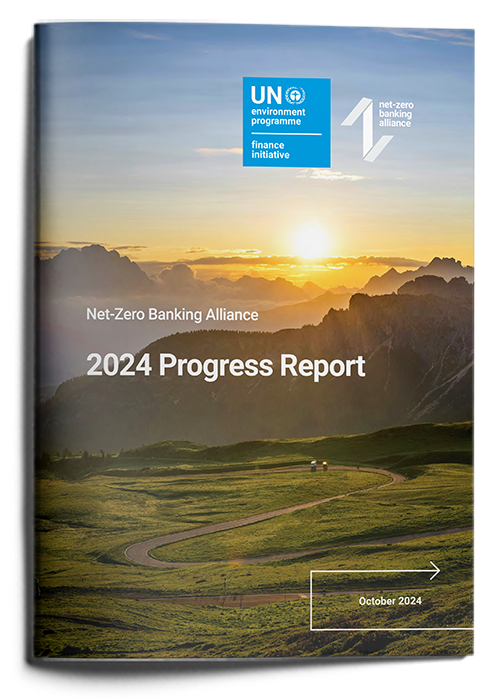 |
Net-Zero Banking Alliance 2024 Progress ReportPublished October 2024 The Net-Zero Banking Alliance’s 2024 Progress Report provides a comprehensive overview of members’ efforts towards achieving net zero by 2050. It offers insights into members’ sectoral decarbonisation targets and transition planning, with fifteen case studies from member banks on topics including green finance, client engagement, and policy advocacy. |
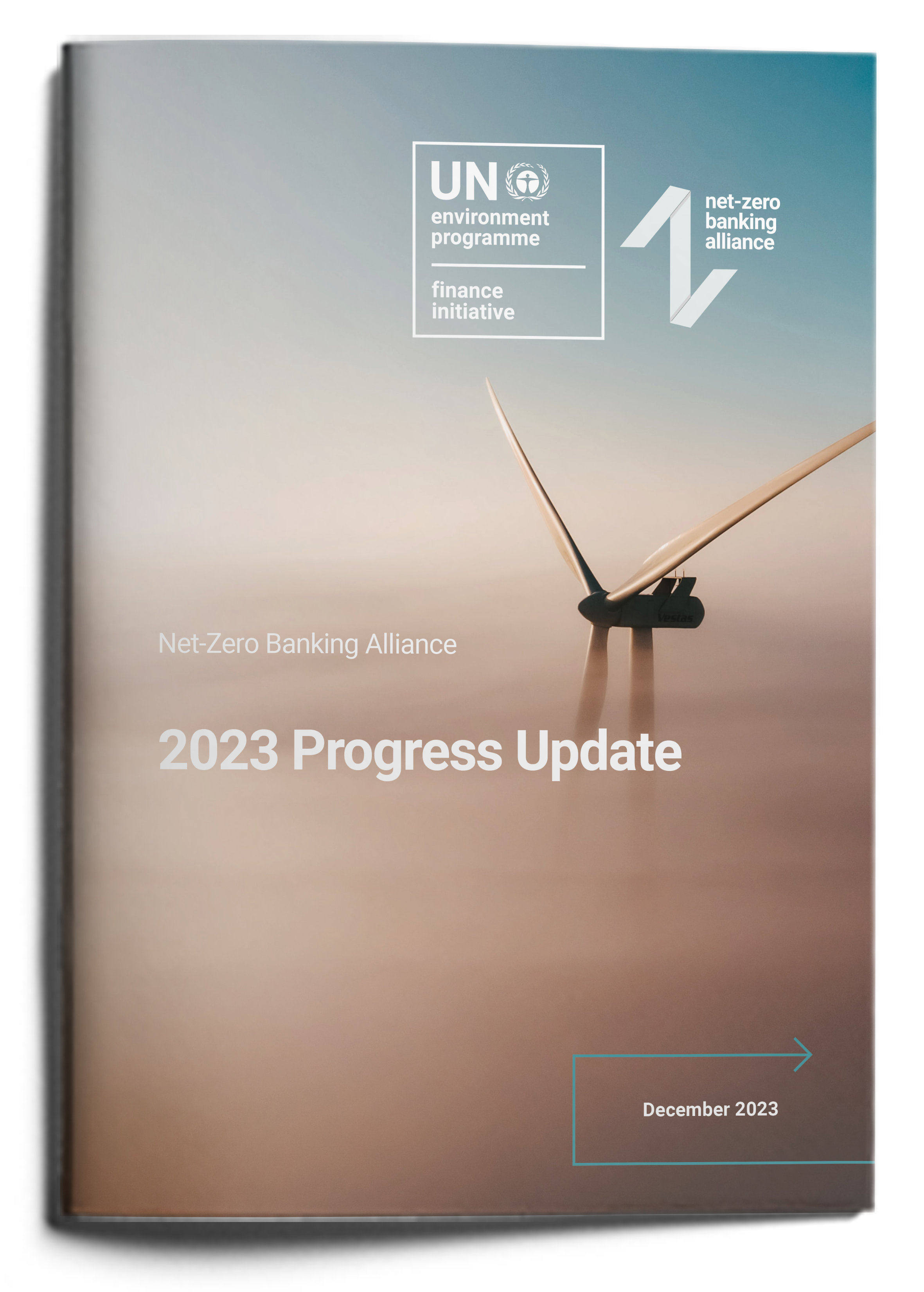 |
Net-Zero Banking Alliance 2023 Progress UpdatePublished December 2023 On Finance Day at COP28, the bank-led, UN-convened Net-Zero Banking Alliance published a Progress Update. This report provides a stocktake of new targets set by Alliance members, highlights a selection of green financing case studies from NZBA banks that showcase the large and growing opportunities across different sectors and asset classes, and summarises relevant developments in climate-related voluntary frameworks and mandatory regulation. |
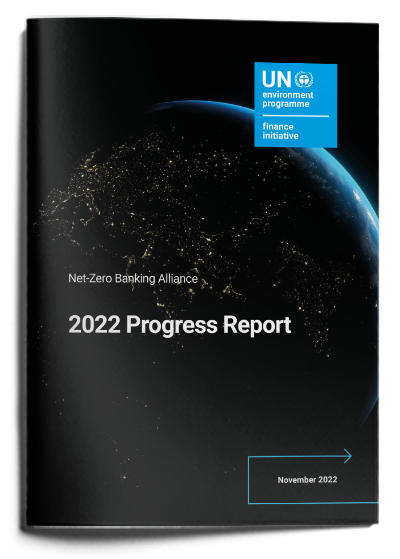 |
Net-Zero Banking Alliance 2022 Progress ReportPublished November 2022 On Finance Day at COP27, the bank-led, UN-convened Net-Zero Banking Alliance launched its first Progress Report. This report details the intermediate 2030 decarbonisation targets from over 60 member banks, with promising indicators of early progress in target setting. The publication also shares the Alliance’s wider vision for creating a predictable and enabling policy environment to accelerate the net-zero transition. |
NZBA Sector Publications
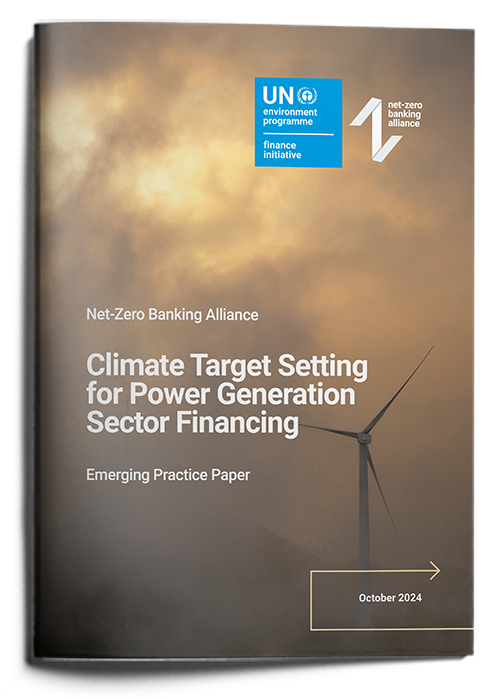 |
Climate Target Setting for Power Generation Sector FinancingPublished October 2024 ‘Climate Target Setting for Power Generation Sector Financing’ is the fifth in a series of publications developed by members of the Net-Zero Banking Alliance (NZBA) with the goal of assisting banks by outlining the choices they face when setting climate-related targets for financing in various carbon-intensive sectors of the real economy. |
 |
Climate Target Setting for Oil & Gas Sector FinancingPublished May 2024 ‘Climate Target Setting for Oil & Gas Sector Financing’ is the fourth in a series of publications developed by members of the Net-Zero Banking Alliance (NZBA) with the goal of assisting banks by outlining the choices they face when setting climate-related targets for financing in various carbon-intensive sectors of the real economy. |
 |
Climate Target Setting for Steel Sector FinancingPublished May 2024 ‘Climate Target Setting for Steel Sector Financing’ is the third in a series of publications developed by members of the Net-Zero Banking Alliance (NZBA) with the goal of assisting banks by outlining the choices they face when setting climate-related targets for financing in various carbon-intensive sectors of the real economy. |
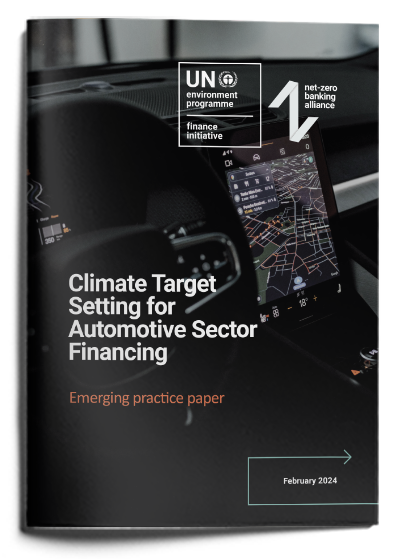 |
Climate Target Setting for Automotive Sector FinancingPublished February 2024 ‘Climate Target Setting for Automotive Sector Financing’ is the second in a series of publications developed by members of the Net-Zero Banking Alliance (NZBA) with the goal of assisting banks by outlining the choices they face when setting climate-related targets for financing in various carbon-intensive sectors of the real economy. |
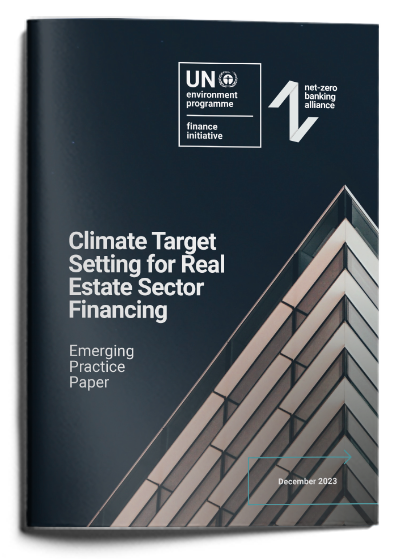 |
Climate Target Setting for Real Estate Sector FinancingPublished December 2023 ‘Climate Target Setting for Real Estate Sector Financing’ is the first in a series of publications developed by members of the Net-Zero Banking Alliance (NZBA) with the goal of assisting banks by outlining the choices they face when setting climate-related targets for financing in various carbon-intensive sectors of the real economy. |
NZBA Resources
 |
Target Setting for Capital Markets ActivitiesPublished October 2024 ‘Target Setting for Capital Markets Activities’ addresses challenges banks face in setting net-zero targets for capital market activities. In summarising the findings of 22 member banks, this supporting note explores four key areas: facilitated emissions, activity scope, target design options, and implementation considerations. |
 |
Climate Mitigation JourneyPublished May 2024 The Climate Mitigation Journey (CMJ) is a manual for banks outlining the business capabilities they need to build and iterate for years to come as they are looking to align themselves with the Paris goal of 1.5°C global warming and net zero, as part of their commitments under the PRB and/or NZBA. |
 |
Developing Metrics for Transition FinancePublished December 2023 Banks’ strategies for managing climate impact have matured, with banks moving from exclusionary policies and targeted sustainable finance to more wide-ranging engagement with clients, especially large corporates. This engagement is helping to encourage companies to set transition plans and to accelerate those plans which, in turn, will support banks’ net-zero strategies if banks have existing exposures to these clients. Financing provided to clients under such engagements is frequently described as “Transition Finance”. This paper discusses how banks may consider reporting their Transition Finance efforts. We see a need for additional specific metrics, as existing metrics may fail to provide a full picture of banks’ approaches to decarbonising their portfolios. |
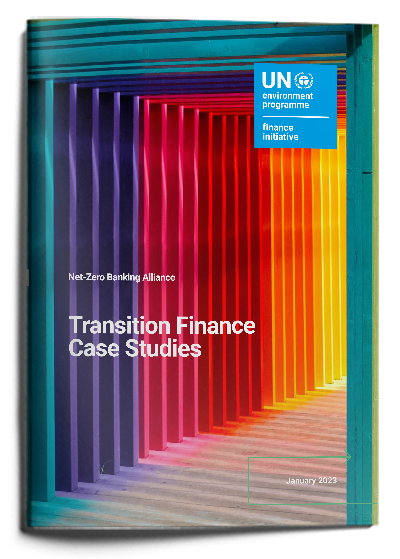 |
Transition Finance Case StudiesPublished January 2023 |
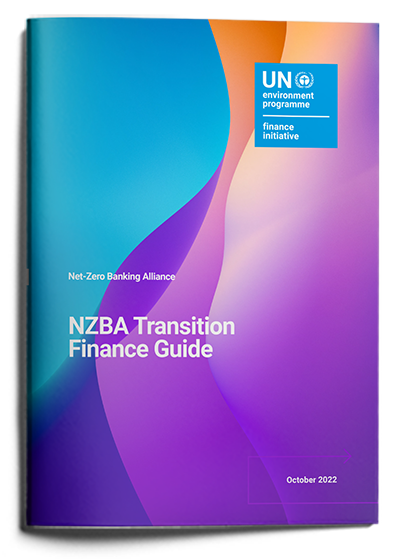 |
NZBA Transition Finance GuidePublished October 2022 |
Case Studies
 |
Blended finance case studiesPublished December 2023 Public finance alone cannot provide the investment needed for the global economy to move towards and achieve net zero. Policy, projects, and financing solutions are needed to mobilise private capital. Here NZBA highlights recent case studies from member banks where the blending of public and private finance was key to their success. |
 |
Green financing in energy and industryPublished December 2023 The transition to net zero in energy and industry is a huge business opportunity for banks. Annual clean energy investments to meet growing energy demand in emerging and developing economies alone will represent an annual investment opportunity of as much as USD 2.8 trillion by the early 2030s. Here NZBA brings together recent examples of financing provided or facilitated by member banks in these key sectors in developed and emerging economies. |
 |
Green financing in transportPublished December 2023 The transition to zero-carbon transport is well underway. Global spending on electric cars increased by 50% in 2022 compared to 2021, reaching around USD 425 billion. Banks are playing an important role in financing established and earlier-stage technologies. Here NZBA gathers recent examples of financing provided or facilitated by member banks in these key sectors in developed and emerging economies. |
The resources on this page are being provided as a convenience and for informational purposes only; they do not necessarily constitute an endorsement or an approval by the Net-Zero Banking Alliance or any of its member organisations. UNEP FI and the Net-Zero Banking Alliance bears no responsibility for the accuracy, legality or content of the documents provided by external sources.